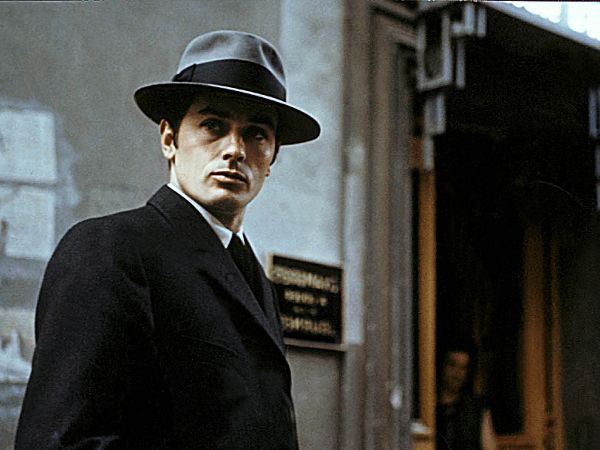Le Samourai
If one is seeking a master class in film direction, one should at least begin with Jean-Pierre Melville's 1967 LE SAMOURAI, a neo noir essential that in every scene showcases loving attention to macro and micro business. Examples? A man has a comically large ring beset with every possible key that might fit in a Citroen, handy when such a vehicle is needed for a getaway; he takes his time, key after key, yet his face registers a certain anxiousness. Two other men break into the first man's apartment and carefully set up a surveillance device. The police meticulously organize a lineup of suspects and subsequent interrogations, which includes that first man, a hitman who has indeed murdered the owner of a jazz club.
In the tradition of hitman lore, the killer holds no personal grudge against his target. Always business.
Melville's screenplay follows Jef (Alain Delon) around Paris pre and post hit, always fascinated with the details around him. More examples? The director focuses on the hasty replacement of license plates in a garage by a standby contact. Jef always slides his hand across the brim of his fedora before leaving his hovel of an apartment, one in which the only hint of luxury are a row of bottles of mineral water. Just about every scene is a certified lesson in cinematic craft, but also economy and minimalism. I imagine an incredible amount of thought and work went into every moment, yet it looks effortless and spare.
Francois de Roubaix's score is minimal too. Silence is all too rare in movies and its presence gives the onscreen action a greater urgency. Even when Jef, an ultra observant fellow, is surveying his apartment (post bugging) with the suspicious eyes of a man who always notices the nano details. Akin to the samarai of the title, and like Melville. It's all in the quote during the opening titles, fictional or otherwise.
LE SAMOURAI manages suspense, particularly during the sequences at the police station. Francois Perier plays the investigating officer with his own keen eye and intellect, almost making the lineups and questioning seem like chess moves, waiting for his opponent to falter. But perhaps he is not as skilled as his target, or the latter's girlfriend Jane (Nathalie Delon), who doesn't cave to the investigator's deal-making/blackmailing so easily. There's also that tense, much imitated sequence: a pursuit through the Metro, as the police employ lookouts to track Jef as he makes his way across town.
There is precious little action. No scene is blocked or cut to showcase choice angles or points of view. But there is mood. There is attention. Alain Delon has a great face and cuts a formidable swath through the City of Light, even if his plight is ultimately similar to that of the little finch in its cage in his sad apartment. This is a brilliantly conceived and executed motion picture, the very template for late '60s cool, naturally incorporating Asian cultural influence and the great noirs of decades past.



Comments